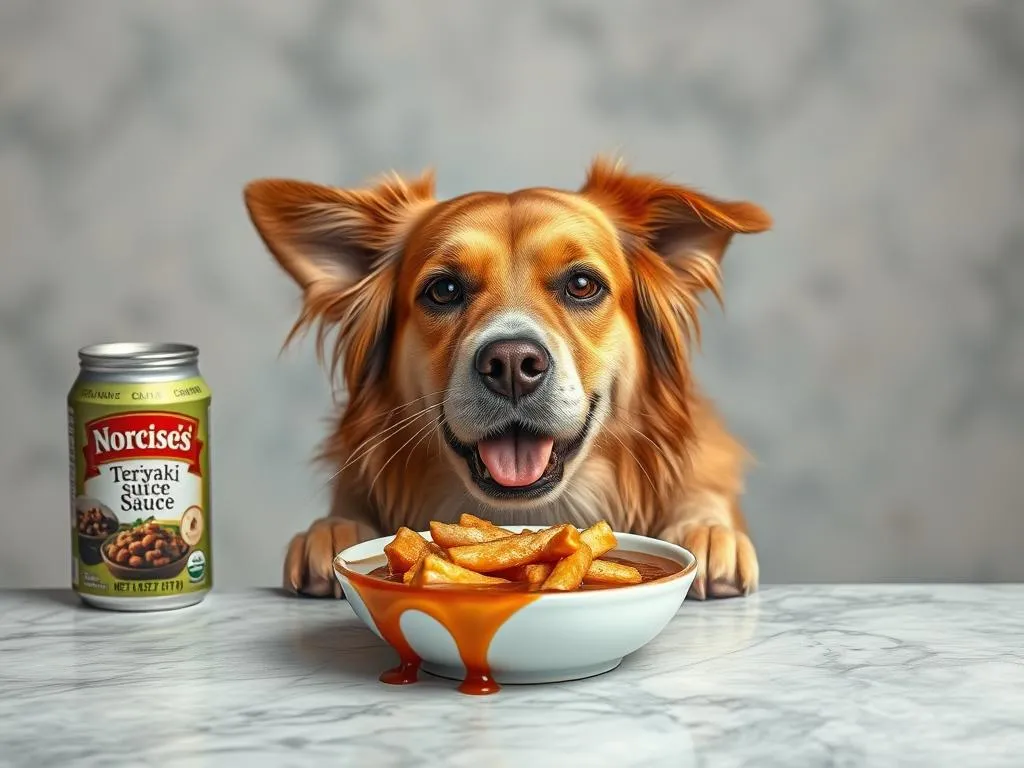
Introduction
Understanding dog nutrition is vital for every pet owner who wants to ensure their furry friend leads a healthy and happy life. Just like humans, dogs have specific dietary needs that must be met to maintain their health, energy, and overall well-being. As dog owners, we often find ourselves tempted to share our food with our pets, but this practice can sometimes lead to dangerous consequences. That’s why it’s crucial to comprehend what human foods are suitable—and which are not—for our canine companions.
One such example is teriyaki sauce, a popular condiment known for its sweet and savory flavor. But can dogs eat teriyaki sauce? This article will delve into the nutritional aspects of dogs, explore the dangers of feeding them human foods, dissect teriyaki sauce’s ingredients, and ultimately determine its safety for dogs.
Understanding Dog Nutrition
Essential Nutrients for Dogs
A well-balanced diet for dogs includes a variety of essential nutrients. These can be broadly categorized into macronutrients and micronutrients.
- Macronutrients:
- Proteins: Essential for growth, repair, and maintenance of body tissues. High-quality protein sources include chicken, beef, and fish.
- Fats: Necessary for energy and promoting healthy skin and coat. Fats also aid in the absorption of fat-soluble vitamins.
-
Carbohydrates: While not strictly essential, carbohydrates provide a good source of energy and help with digestive health.
-
Micronutrients:
- Vitamins: Vital for various bodily functions, including metabolism and immune function. Common vitamins include A, D, E, and B-complex vitamins.
- Minerals: Important for bone health, nerve function, and muscle contraction. Key minerals include calcium, phosphorus, and potassium.
Common Dietary Needs by Dog Size and Breed
Nutritional requirements can vary significantly based on a dog’s size, breed, and life stage.
- Small Breeds: Often have higher metabolic rates and may require more calorie-dense foods.
- Medium Breeds: Typically require a balanced diet that supports their active lifestyle.
- Large Breeds: Need a diet that supports their growth and prevents issues like hip dysplasia.
Puppies, adult dogs, and senior dogs also have unique dietary needs. Puppies need growth formulas, adult dogs require maintenance diets, while senior dogs often benefit from lower-calorie foods that are easier to digest.
The Dangers of Feeding Dogs Human Foods
Foods That Are Toxic to Dogs
Not all human foods are safe for dogs. Some common toxic foods include:
- Chocolate: Contains theobromine, which is toxic to dogs.
- Grapes and Raisins: Can cause kidney failure in dogs.
- Onions and Garlic: Can lead to anemia by damaging red blood cells.
Risks Associated with Human Foods
Beyond toxic ingredients, feeding dogs human foods poses several risks:
- Allergies and Sensitivities: Dogs can develop food allergies or intolerances, leading to skin issues and gastrointestinal distress.
- Gastrointestinal Issues: Sudden changes in diet can cause vomiting, diarrhea, or more severe digestive problems.
- Long-term Health Risks: Regularly feeding dogs human foods can contribute to obesity and related health issues, such as diabetes and heart disease.
Teriyaki Sauce and Its Ingredients
Breakdown of Teriyaki Sauce Ingredients
To determine if dogs can eat teriyaki sauce, it’s essential to analyze its ingredients:
- Soy Sauce: Made from fermented soybeans and can be high in sodium, which isn’t suitable for dogs. Excessive sodium can lead to increased thirst and urination or even sodium ion poisoning in severe cases.
- Sugar and Sweeteners: High sugar content can lead to obesity and dental issues. Additionally, some sweeteners like xylitol are toxic to dogs.
- Other Common Ingredients: Ingredients such as garlic and ginger can pose health risks. Garlic, in particular, can be toxic and lead to anemia in dogs.
Nutritional Analysis of Teriyaki Sauce
A typical serving of teriyaki sauce contains substantial calories primarily from sugars and sodium. Here’s a general breakdown:
| Nutrient | Amount per 1 tablespoon |
|---|---|
| Calories | 15 |
| Sugar | 3-5 grams |
| Sodium | 300-600 mg |
When compared to dog-specific treats or foods, teriyaki sauce lacks the necessary nutrients and can introduce harmful ingredients instead.
Can Dogs Eat Teriyaki Sauce?
Nutritional Value vs. Risks
The nutritional value of teriyaki sauce for dogs is minimal, and the potential risks far outweigh any benefits. While the sauce may seem appealing due to its flavor, the high sodium content and presence of harmful ingredients make it unsuitable for canine consumption.
Expert Opinions and Vet Recommendations
Veterinarians generally advise against feeding dogs any form of teriyaki sauce. They recommend opting for dog-safe treats and foods that meet their unique dietary needs. If you’re looking to spice up your dog’s meals, consider using dog-friendly seasonings or sauces specifically formulated for canine consumption.
Alternatives to Teriyaki Sauce for Dogs
Safe Human Foods for Dogs
If you’re looking for human foods that are safe for dogs, consider these options:
- Fruits: Apples (without seeds), blueberries, and bananas.
- Vegetables: Carrots, green beans, and sweet potatoes.
- Proteins: Cooked chicken, turkey, and fish (without bones).
Homemade Dog Treat Recipes
Creating dog-friendly treats can be a fun way to ensure your pet enjoys tasty snacks without the risks associated with human foods. Here are a couple of simple recipes:
- Peanut Butter and Banana Treats:
- 1 ripe banana
- 1 cup peanut butter (ensure it’s xylitol-free)
- 2 cups oat flour
Instructions:
– Preheat the oven to 350°F (175°C).
– Mash the banana and mix with peanut butter.
– Gradually add oat flour until a dough forms.
– Shape into small cookies and bake for 15-20 minutes.
- Carrot and Apple Biscuits:
- 1 cup grated carrots
- 1 cup grated apple (remove seeds)
- 2 cups whole wheat flour
- 1 egg
Instructions:
– Preheat the oven to 350°F (175°C).
– Mix all ingredients until combined.
– Roll out and cut into shapes.
– Bake for 20-25 minutes until golden.
These homemade treats not only avoid harmful ingredients but also provide health benefits like vitamins and fiber.
Best Practices for Dog Nutrition
Creating a Balanced Diet
A balanced diet is crucial for your dog’s health. This includes a proper ratio of proteins, fats, carbohydrates, vitamins, and minerals. Consult with your veterinarian to create a diet plan tailored to your dog’s specific needs, factoring in their age, size, and activity level.
Monitoring Your Dog’s Health
Regularly observing your dog’s health is essential. Look for signs of food allergies or intolerances, such as:
- Itchy skin or excessive scratching
- Gastrointestinal issues like diarrhea or vomiting
- Changes in appetite or weight
Regular vet check-ups can help catch any potential health issues early and ensure your dog is on the right dietary path.
Conclusion
In summary, while it might be tempting to share your favorite teriyaki sauce with your canine companion, the risks far outweigh any potential benefits. Understanding dog nutrition and being informed about the safety of various human foods is crucial for every dog owner. Feeding your dog a balanced diet with safe, nutritious foods will contribute to their overall health and happiness.
Always consult with your veterinarian before introducing new foods into your dog’s diet to ensure that you are making informed and safe choices for your beloved pet.









